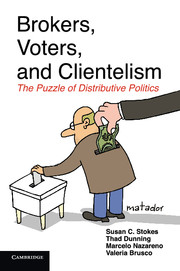Book contents
- Frontmatter
- Dedication
- Contents
- List of Tables
- List of Figures
- Preface and Acknowledgments
- I MODALITIES OF DISTRIBUTIVE POLITICS
- II THE MICRO-LOGIC OF CLIENTELISM
- 2 Gaps Between Theory and Fact
- 3 A Theory of Broker-Mediated Distribution
- 4 Testing the Theory of Broker-Mediated Distribution
- 5 A Disjunction Between the Strategies of Leaders and Brokers?
- 6 Clientelism and Poverty
- III THE MACRO-LOGIC OF VOTE BUYING: WHAT EXPLAINS THE RISE AND DECLINE OF POLITICAL MACHINES?
- IV CLIENTELISM AND DEMOCRATIC THEORY
- Appendix A: Argentina Brokers' Survey
- Appendix B: Argentina Voters' Surveys
- Appendix C: Venezuela Voters' Survey and the Maisanta Database
- Appendix D: India Voters' Survey
- References
- Index
- Miscellaneous Endmatter
4 - Testing the Theory of Broker-Mediated Distribution
Published online by Cambridge University Press: 05 June 2014
- Frontmatter
- Dedication
- Contents
- List of Tables
- List of Figures
- Preface and Acknowledgments
- I MODALITIES OF DISTRIBUTIVE POLITICS
- II THE MICRO-LOGIC OF CLIENTELISM
- 2 Gaps Between Theory and Fact
- 3 A Theory of Broker-Mediated Distribution
- 4 Testing the Theory of Broker-Mediated Distribution
- 5 A Disjunction Between the Strategies of Leaders and Brokers?
- 6 Clientelism and Poverty
- III THE MACRO-LOGIC OF VOTE BUYING: WHAT EXPLAINS THE RISE AND DECLINE OF POLITICAL MACHINES?
- IV CLIENTELISM AND DEMOCRATIC THEORY
- Appendix A: Argentina Brokers' Survey
- Appendix B: Argentina Voters' Surveys
- Appendix C: Venezuela Voters' Survey and the Maisanta Database
- Appendix D: India Voters' Survey
- References
- Index
- Miscellaneous Endmatter
Summary
“‘Machines win elections.”
– Party operative in Petare, Venezuela, 2010.“I've been working there for 20 years and I know who is a Peronist and who isn't or who might have an affinity and vote for the Peronists.”
– Broker in Córdoba province, Argentina, 2002.The broker-mediated model of clientelism is cogent as a theory. It also offers a resolution to the “too-favored-loyalist” paradox. But does our theory capture the realities of distributive politics by machines? This chapter offers evidence in favor of our theoretical approach. We rely on a number of sources of evidence. Because our theory focuses squarely on the incentives and behavior of brokers, we appeal first and foremost to our most direct source of data on brokers: our rich probability sample of city councilors and brokers from four Argentine provinces. We supplement the broker survey with other information, including from our open-ended interviews with brokers, conducted outside of the context of the broker survey. We also draw on original data and information from Venezuela and India.
We offer evidence of the following:
Brokers Know “Their” Voters. Brokers are indeed involved in long-lived interactions with their neighbors and clients, interactions which – in the brokers' view – give them privileged information about the preferences and behaviors of individual voters. They believe that they can observe the political preferences and actions of “their” voters: they know their clients.[…]
- Type
- Chapter
- Information
- Brokers, Voters, and ClientelismThe Puzzle of Distributive Politics, pp. 96 - 129Publisher: Cambridge University PressPrint publication year: 2013



